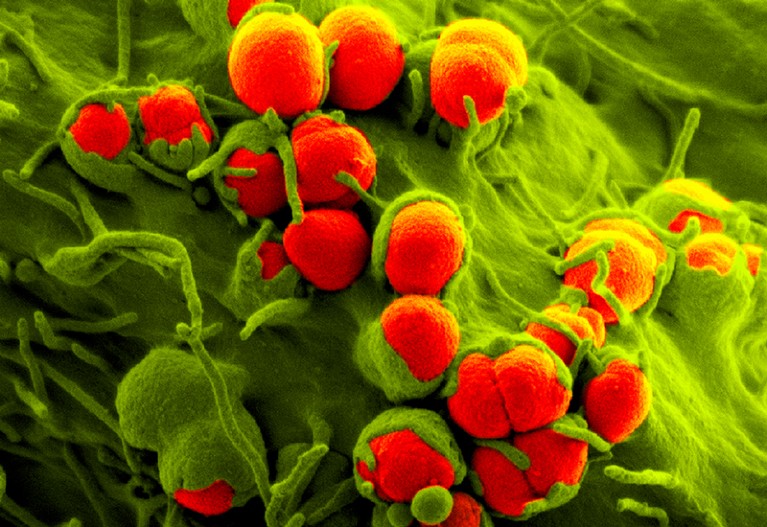[ad_1]
Hello Nature readers, would you like to get this Briefing in your inbox free every day? Sign up here

Gonorrhoea bacteria (pictured) have developed resistance to some antibiotics. Credit: SPL
A health department in the United States has become one of the first to recommend that people who are at high risk of getting a sexually transmitted infection (STI) take a preventive dose of antibiotics after unprotected sex. Clinical trials have shown the strategy can reduce infections such as chlamydia, syphilis and gonorrhoea. But some researchers worry it will contribute to antibiotic resistance. Researchers say guidelines about use are important for informing people about the safety of a strategy they might already be using. “People should have access to this tool, if it makes sense for them and their lifestyle,” says sexual-health physician Jenell Stewart.
Bacterial infections were associated with close to 8 million deaths in 2019, making them the second biggest killer globally after coronary heart disease. Death rates differed widely by region, from 230 deaths per 100,000 people in sub-Saharan Africa to 52 deaths per 100,000 across western Europe, North America and Australasia. “These new data for the first time reveal the full extent of the global public health challenge posed by bacterial infections,” says study co-author Christopher Murray.
Reference: The Lancet paper
In the wake of the 27th United Nations climate conference (COP27) in Egypt, diplomats, activists and scientists are pondering how to make such events more impactful. Some stakeholders suggest that COPs could focus less on targets and more on how to incentivize drastic reductions in greenhouse-gas emissions, with rich countries leading the way.
Features & opinion
This year, the first trials of pig organs transplanted into humans have raised expectations for xenotransplantation. In January, a man who was too ill to qualify for a human or artificial heart was granted emergency authorization to receive a pig heart. He lived for almost two months after the procedure. Other tests have seen genetically modified pig kidneys transferred into people who had been declared legally dead. Proponents of more clinical trials say xenotransplantation could help to make a large dent in the list of the thousands of people in need of organ transplants. “I think we need to take that step forward and go to the clinic,” says transplant surgeon Wayne Hawthorne. But the mood is cautious. “If there’s a problem, you could set the whole field back.”
In March, after nearly 30 years of researchers warning that plastics were a growing global problem, 175 nations voted in Nairobi to create a legally binding international plastics treaty. Negotiations start in earnest in Uruguay on 28 November. Yet the only way to ensure that a treaty — expected to be completed by the end of 2024 — is effective is to know where plastics come from, where they go and who’s responsible, every step of the way. Researchers are contributing by collecting tiny plastic particles from beaches, measuring light -reflecting off debris with satellites and dropping GPS-tagged bottles into India’s Ganges River.
Philosopher and anthropologist Bruno Latour brought a Gallic sensibility to his trailblazing work in science and technology studies, writes sociologist Steve Woolgar, with whom he wrote the influential 1979 book Laboratory Life. “He wrote about profound issues with a disarming lightness,” writes Woolgar. “At a lecture at the University of Oxford in 2003, a junior researcher dared to interrupt Bruno to point out a logical inconsistency. Bruno paused, and exclaimed: ‘But I am French!’, to rapturous applause.” Latour has died aged 75.
“I think there’s a lot of ‘equity washing’ — if I can invent a term — which really pisses me off,” writes Dolors Armenteras Pascual, a biodiversity conservation researcher in Colombia, in a short, straight-talking call for more equitable partnerships with collaborators from the global north. “By that, I mean researchers or institutions add superficial, in-name-only equity efforts to their departments, events or collaborations — and nothing changes.” Her recommendations for researchers: avoid tokenism, build long-term collaborations and don’t be extractive.
Read more: Guidelines for healthy global scientific collaborations (Nature Ecology & Evolution | 7 min read, from 2021)
Infographic of the week

A prototype navigation system overcomes obstacles to achieve centimetre-level accuracy. The system uses a telecommunications technique known as orthogonal frequency-division multiplexing (OFDM) to combine multiple mobile-phone signals. The transmitters are connected by optical cables to make sure they are perfectly synchronized (Nature News & Views | 7 min read, Nature paywall)
See more of the week’s key infographics, selected by Nature’s news and art teams.
[ad_2]
Source link

